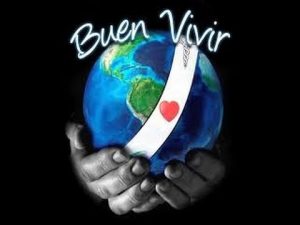
Beyond Capitalism?
There is a grand experiment afoot here, an initiative to do more than merely subsist or materially profit. It’s called Buen Vivir. To live well. Based on an older Andean ideal called (in Kichwa): Sumak Kawsay.
The meaning is more nuanced than it first appears; it’s not solely about the good life of an individual but about a good life within the community. And the community includes a harmonious cohabitation with nature and the world. It’s not a system designed to profit the 1%, it’s an actual plan, a roadmap, which along with their constitution encapsulates a vision for what Ecuador is striving to become. The 12 directions envisioned, corresponding to 12 points of the Andean cross (chakana), are:
- To Foster Social and Territorial Equality, Cohesion, and Integration with Diversity.
- To Improve the Citizens’ Capabilities and Potentialities.
- To Improve the Quality of Life of the Population.
- To Guarantee the Rights of Nature and Promote a Healthy and Sustainable Environment.
- To Guarantee Sovereignty and Peace; to Promote Ecuador’s Strategic Insertion in the World, and Latin American Integration.
- To Guarantee Stable, Fair and Dignified Work in its Diverse Forms.
- To Build and Strengthen Public and Intercultural Spaces for Social Interactions.
- To Affirm and Strengthen National Identity, Diverse Identities, Plurinationalism and Interculturalism.
- To Guarantee Rights and Justice.
- To Guarantee Access to Public and Political Participation.
- To Establish a Sustainable Socio-economic System Based on Solidarity.
- To Build a Democratic State for Good Living.
These priorities emphasize community, respect for nature and integration with diversity. Almost each point stands in blatant contrast to pure capitalism, which is more focused on the unfettered market as a rudder for a morality and progress based on immediate and personal gain. As if a free market itself will somehow work out for the public good. Just like the “trickle down” belief … how’s that working for us? Too soon?
Models of progress through development like we have in the US and most of the “first” world, rely on an infinitely expanding pool of consumers and producers … it’s not really designed to ever come to a state of balance and it assumes unlimited resources. We’re slowly discovering that’s not the case and a number of our assumptions, which may have worked on smaller scales of human population, are wrecking havoc in the massively populated world of today.
There are only so many cars we can sell, until everybody has one or two and the world chokes on smog (imagine if everyone in India and China had a car?) And then come the layoffs in the factories and the distribution chains that depend on steady and growing sales. Making and selling more and more stuff sustains jobs, which requires tapping more and more raw resources and siphoning more energy from the planet is not a viable long term solution. And that “long term” is looking more and more like today, instead of some distant future.
There are, however, some very very rich interests that don’t want to see these wheels grind to a stop until the world itself does. And then they’ll step off and claim it was a good ride, while it lasted. The best game in town. For them. But Buen Vivir is more about us. Respect for each of us, our children, their children and these long suffering, intelligent entities of nature and this mother earth that makes living here possible.
This is a new type of constitution, not just about an individual’s rights “to the pursuit of happiness”, but about their responsibilities to each other and to a world where we have been nothing but takers. Perhaps we can learn to live with, and even respect, the diversity that is our world and our selves before we, and it, are destroyed in the wake of our rigid and limited vision. Or not.